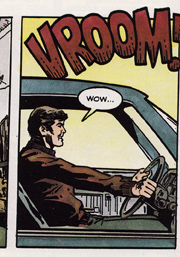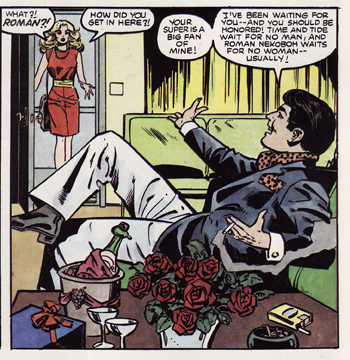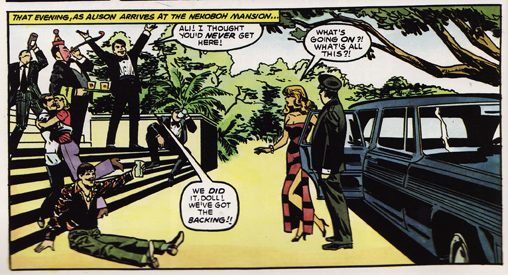This Movie Gets Two Thumbs Down!
/How do I let myself get talked into these things? One of my regular customers at Strange Adventures, Michael Coll, recently bought a bunch of Marvel graphic novels off eBay—you know, the ones from the Eighties that featured original stories in a cool oversized squarebound format? These upscale editions were usually reserved for important stories (The Death of Captain Marvel, The New Mutants) or high profile creative teams (Miller and Sienkiewicz on Daredevil: Love and War, Starlin and Wrightson on Hulk/Thing: The Big Change). Every once in a while, though, a particular project made it into this format that really didn’t warrant the treatment. I’m talking about stuff like Super Boxers, The Aladdin Effect, and the book I’m here to discuss today—Dazzler: The Movie. Y’see, Mike was buying a bunch of good stuff, and this book was offered to be thrown in for a mere dollar, so he went for it. Afterwards, he decided that it was the worst Marvel comic he had ever read, and apparently wanted to share the pain. He brought it in to the store and told me I should review it. Unflinchingly, I agreed, although deep down I think I already knew I would regret it.

The highlight, really the only interesting thing about this book, is Bill Sienkiewicz’s eye-catching cover. He was truly at the top of his game at this point, even though he clearly hadn’t read the book—I have no idea who the other characters on this cover are, ‘cause they sure don’t appear inside.

Oh, come on, Freddy. You’re not a nerd. You don’t even have a pocket protector! You’re clearly a dweeb, or at the very least, a spaz. Anyway, Alison boosts his confidence with some well-chosen compliments and a friendly yet passionate smooch.

That, in case you're wondering, is the sound of Freddy’s boner. We now switch scenes to the home of a Sinatraesque crooner named Roman Nekoboh (read backwards: Hoboken Namor?), who I guess must have been a supporting character in the Dazzler series. He’s plotting to win Alison over while getting ready for his day—I’ll spare you the montage of him getting dressed. It’s pretty damn disgusting. He surprises Alison at her apartment with a friendly home invasion:

Roman quickly puts the smooth on Alison, but it doesn’t go so well.

What’s her problem, anyway? Who wouldn’t want to come home to a guy dressed like the millionaire from Gilligan’s Island who proceeds to destroy half her stuff while trying to rape her? Alison throws him out, but the next day Roman accosts her from his car. Alison rebuffs him once again, but this time, Roman isn’t taking no for an answer.

Thanks for the traffic tip, Ali. This has been a very special issue of Spidey Super Stories.

Admittedly, that does look like a pretty fun party. They’ve got noisemakers and everything! In the middle of the day, even! Unfortunately, the financial backing for the movie project comes from Eric Beale, which makes Alison understandably nervous…

You mean, Beale wants to use his wealth and influence to get you into bed? What kind of self-respecting woman would allow a creepy older gadabout to…oh. Never mind. As the project moves forward, Alison gets more bitchy and self-involved, as evidenced by her perpetual drinking and smoking. Catching herself in the mirror, she becomes disgusted with what she’s become, and strips off all her clothes in a stupidly symbolic gesture (the mirror thing is a recurring motif in the book—every once in a while, she talks to her own reflection like a mental patient). Then, this happens!

Whoa, sidebum! See, here’s the largest of the book’s many, many problems: a lot of the time, it’s a simplistic morality tale that appears to have been written for eight-year olds (see Alison’s earlier observation about U-turns), but then there’s implied sex, substance abuse, and nudity! It turns out Roman is busting in on Alison’s naked ruminations to tell her that he has publicly outed her as a mutant, hoping to stir up publicity for her upcoming movie. Alison is outraged, but agrees to demonstrate her powers for the hardworking, dedicated, noble, truth-seeking media:

Uh, right. Which one are you, Woodward or Bernstein? Anyway, Alison’s powers frighten the assembled media like she was a sexy King Kong, causing a near riot.

Well, to be fair, Ali, you are kind of dressed like a Dracula. The movie finally goes into production, with extra pressure now on Alison. She feels that she is now being forced to represent all mutantkind, and she wants the film to reflect the idea that mutant powers can be used for the betterment of humanity. Perhaps a nuanced fable about race relations, warning against the dangers of discrimination?

Or not. Incidentally, Alison, you're not the director, so you don't get to call "Action", dummy. The whole thing goes pear-shaped when the tide of public sentiment turns against Alison and Roman, probably when some early footage of this turd got leaked would be my guess. Alison eventually learns that her contract will turn all control of her future career over to Eric Beale, so she destroys it and the one existing copy of her finished movie, thank goodness. Her life and career once again in her hands, Alison says goodbye to Roman and faces the future with a smile. Sheesh.

I’ll take that as a yes.




